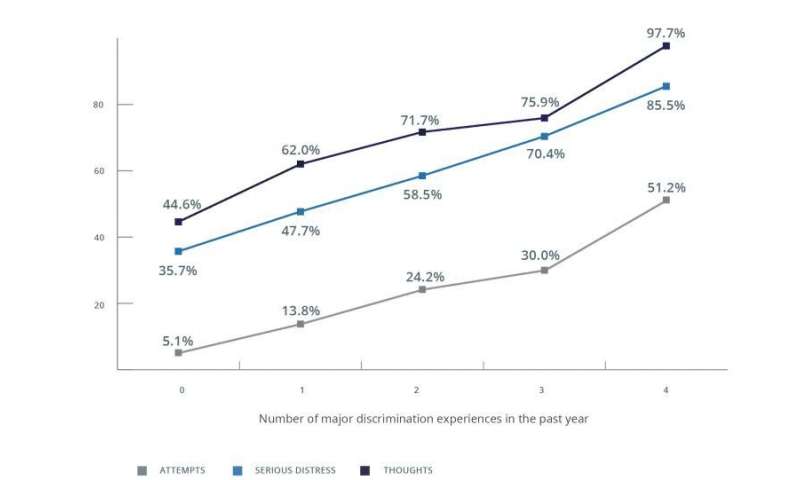
A new UCLA-led analysis of data from the 2015 U.S. Transgender Survey found that more than half of respondents, 51.2 percent, who had experienced four types of anti-transgender discrimination and violence—losing a job, eviction, homelessness and physical attack—in the past year reported attempting suicide in that year. And 97.7 percent of them had seriously thought about suicide.
New analysis of data from the 2015 U.S. Transgender Survey found that over half (51.2 percent) of respondents who had experienced four instances of anti-transgender discrimination and violence in the past year reported attempting suicide in that year. Nearly all (97.7 percent) had seriously thought about suicide.
Respondents who had experienced losing a job, eviction, homelessness, and physical attack in the past year were ten times more likely to have reported suicide attempts in that year compared to those who experienced none of these.
“Experiences of discrimination and serious psychological distress go hand-in-hand, and both are associated with suicide thoughts and attempts among transgender people,” said lead author Jody L. Herman, scholar of public policy at the Williams Institute. “Public policies that aim to reduce discrimination against transgender people are suicide prevention efforts.”
Previous research has found that transgender people have many of the same risk factors for suicidality as the U.S. general population, such as depression, substance abuse, poor health, and homelessness. However, the current study finds that transgender people also face additional risk factors, such as discrimination, family rejection, and lack of access to gender-affirming health care.
Key Findings
- Respondents who experienced discrimination were more likely to report suicide thoughts and attempts. Transgender people who had been denied equal treatment because they are transgender were twice as likely to report past-year suicide attempts as those who had not experienced such treatment (13.4 percent compared to 6.3 percent).
- Respondents who experienced family rejection were also more likely to report attempting suicide. Respondents who were rejected by their family of origin were twice as likely to report past-year suicide attempts compared to those who had not experienced such rejection (10.5 percent compared to 5.1 percent).
- Being a victim of violence was related to an elevated prevalence of suicide thoughts and attempts. Over 30 percent of those who were physically attacked in a place of public accommodation reported attempting suicide in the past year, compared to 7 percent of respondents who were not similarly attacked.
- Access to gender-affirming medical care is associated with lower prevalence of suicide thoughts and attempts. Respondents who wanted and subsequently received gender-affirming surgical care were less likely to report suicide attempts in the past year compared to those who wanted it but had not received it (5.1 percent vs 8.5 percent).
“Our analysis suggests that, along with improving access to quality gender-affirming health services, suicide prevention efforts must target the social structures and institutions that stigmatize transgender people and lead to the pervasive discrimination and violence they report,” said study author Ann P. Haas, Professor Emerita in the Department of Health Sciences, Lehman College of the City University of New York.
Source: Read Full Article



